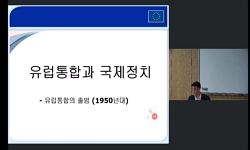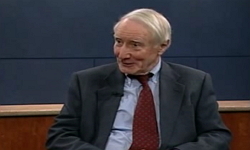The external-balancing diplomacy of Poland has possibility for a segmentation between East and West in Europe by strengthening the regional fault line, while also strengthening the Euro-Atlantic network. The economical-engaging diplomacy of Hungary co...
http://chineseinput.net/에서 pinyin(병음)방식으로 중국어를 변환할 수 있습니다.
변환된 중국어를 복사하여 사용하시면 됩니다.
- 中文 을 입력하시려면 zhongwen을 입력하시고 space를누르시면됩니다.
- 北京 을 입력하시려면 beijing을 입력하시고 space를 누르시면 됩니다.

역사적 경험에서 바라본 탈냉전기 폴란드와 헝가리의 중간국 외교 = Polish and Hungarian Foreign Policy as a Middle State during the Post-Cold War Era
한글로보기부가정보
다국어 초록 (Multilingual Abstract)
The economical-engaging diplomacy of Hungary could weaken the local fault line and at the same time lead to strengthening the Eurasian network. However, Hungarian tendencies of nationalism have a room for fragmentation in Europe. Poland hopes to have an initiative to seize the power in the central-eastern region, and has a strong desire to make Ukraine a middle country. Russia and Belarus play a role in transforming the regional composition for Poland, and these countries can be regarded as structural blank areas in Poland. Hungary may have relatively few structural voids compared to Poland and has an opportunity as an intermediary in the region. In the end, Poland's diplomacy has the strength of more than a middle-powered country in the region and has the opportunity to transform the hegemony in the region, but at the same time poses the weakness of the geopolitical fault line and the threat of hegemony. Hungarian diplomacy has strengths that are not geographically adjacent to hegemony and the opportunity to play the role of a middle man, but she has weakness of the national power in the region and are also subject to the risk of forced choice due to changes of world hegemony. Today, in the context of Central Europe, where national independence is strengthened rather than the European Union's communality, the search for a balance between Polish and Hungarian sovereignty, alliance, and multilateral cooperation system will be diplomatic tasks. This study aims to analyze the characteristics and tasks of diplomacy of Poland and Hungary as a middle country through the context of the times and internal and external backgrounds.
The external-balancing diplomacy of Poland has possibility for a segmentation between East and West in Europe by strengthening the regional fault line, while also strengthening the Euro-Atlantic network.
The economical-engaging diplomacy of Hungary could weaken the local fault line and at the same time lead to strengthening the Eurasian network. However, Hungarian tendencies of nationalism have a room for fragmentation in Europe. Poland hopes to have an initiative to seize the power in the central-eastern region, and has a strong desire to make Ukraine a middle country. Russia and Belarus play a role in transforming the regional composition for Poland, and these countries can be regarded as structural blank areas in Poland. Hungary may have relatively few structural voids compared to Poland and has an opportunity as an intermediary in the region. In the end, Poland's diplomacy has the strength of more than a middle-powered country in the region and has the opportunity to transform the hegemony in the region, but at the same time poses the weakness of the geopolitical fault line and the threat of hegemony. Hungarian diplomacy has strengths that are not geographically adjacent to hegemony and the opportunity to play the role of a middle man, but she has weakness of the national power in the region and are also subject to the risk of forced choice due to changes of world hegemony. Today, in the context of Central Europe, where national independence is strengthened rather than the European Union's communality, the search for a balance between Polish and Hungarian sovereignty, alliance, and multilateral cooperation system will be diplomatic tasks. This study aims to analyze the characteristics and tasks of diplomacy of Poland and Hungary as a middle country through the context of the times and internal and external backgrounds.
국문 초록 (Abstract)
폴란드의 외적균세형 외교는 지역 단층선을 강화시켜 동서 간 분절을일으킬 수 있는 여지를 안고 있는 동시에 유로대서양 네트워크 강화의 측면도 있다. 헝가리의 경제적 관여형 외교는 지...
폴란드의 외적균세형 외교는 지역 단층선을 강화시켜 동서 간 분절을일으킬 수 있는 여지를 안고 있는 동시에 유로대서양 네트워크 강화의 측면도 있다. 헝가리의 경제적 관여형 외교는 지역 단층선을 약화시킬 수있는 동시에 유라시아 네트워크 강화를 유도할 수 있다. 다만 헝가리의민족주의적 성향은 유럽 내 분절을 일으킬 수 있는 여지를 안고 있다. 폴란드는 역내 중심 권력을 장악하려는 이니셔티브 선호적 열망을 지니고있고, 우크라이나를 중간국화 시킬 수 있는 요인을 안고 있다. 폴란드에러시아와 백러시아는 역내 구도를 변환시킬 수 있는 역할을 하고 있고, 이들 지역이 폴란드에는 구조적 공백지역이라 볼 수 있다. 헝가리는 폴란드에 비해 상대적으로 구조적 공백지역이 적을 수 있고, 역내 중개자로서기회를 안고 있다. 결국 폴란드 외교는 역내 중견국 이상 국력의 강점을지니고 있고, 역내 패권을 전환시킬 수 있는 기회를 안고 있지만, 지정학적 단층선의 약점과 패권의 위협을 감당할 위험을 동시에 갖고 있다. 헝가리 외교는 지리적으로 패권과 인접하지 않은 강점과 중간자의 역할을행할 수 있는 기회를 지니고 있지만, 역내 국력의 미비한 약점과 패권구도 변화에 따른 강요된 선택의 위험을 안고 있다. 오늘날 유럽연합의 공동체성보다 국가의 독립성이 강화되는 중부유럽의 흐름과 지역협력의 공백이 발생하는 상황에서 폴란드와 헝가리 외교의 주권, 동맹, 다자협력체제의 균형점 모색은 외교적 과제로 떠오를 것이다. 본 연구는 중간국가로서 폴란드와 헝가리 외교의 특징과 과제를 시대적 환경과 내외적 배경을통해 분석해 보고자 한다.
참고문헌 (Reference)
1 에너지경제연구원, "현안인사이트" 16 (16): 2016
2 김계동, "현대외교정책론" 명인문화사 2007
3 이상협, "헝가리의 민족문제와 소수민족 정책" 동유럽발칸연구소 10 (10): 269-293, 2002
4 이상협, "헝가리사" 대한교과서주식회사 1996
5 Körösényi, András, "헝가리 현대정치론 : 전환기의 동유럽 정치" 신광문화사 2014
6 우준모, "푸틴주의의 외교적 구현: 실제와 함의" 동유럽발칸연구소 43 (43): 129-169, 2019
7 김유정, "폴란드-러시아의 역사적 갈등지속요인 고찰" EU연구소 (45) : 169-200, 2017
8 홍현익, "탈냉전기 폴란드와 우크라이나의 대외안보전략 연구" 세종연구소 2015
9 제성훈, "탈냉전기 러시아-몽골관계의 변화: 지정학적 ‘완충국’ 개념을 중심으로" 한국국제정치학회 50 (50): 167-192, 2010
10 김대순, "탈 사회주의 시대 헝가리 외교정책의 변화: 동족민족 처우개선 문제 및 주변국 정책, 미완의 과제" 사단법인 한국민족연구원 (49) : 102-118, 2012
1 에너지경제연구원, "현안인사이트" 16 (16): 2016
2 김계동, "현대외교정책론" 명인문화사 2007
3 이상협, "헝가리의 민족문제와 소수민족 정책" 동유럽발칸연구소 10 (10): 269-293, 2002
4 이상협, "헝가리사" 대한교과서주식회사 1996
5 Körösényi, András, "헝가리 현대정치론 : 전환기의 동유럽 정치" 신광문화사 2014
6 우준모, "푸틴주의의 외교적 구현: 실제와 함의" 동유럽발칸연구소 43 (43): 129-169, 2019
7 김유정, "폴란드-러시아의 역사적 갈등지속요인 고찰" EU연구소 (45) : 169-200, 2017
8 홍현익, "탈냉전기 폴란드와 우크라이나의 대외안보전략 연구" 세종연구소 2015
9 제성훈, "탈냉전기 러시아-몽골관계의 변화: 지정학적 ‘완충국’ 개념을 중심으로" 한국국제정치학회 50 (50): 167-192, 2010
10 김대순, "탈 사회주의 시대 헝가리 외교정책의 변화: 동족민족 처우개선 문제 및 주변국 정책, 미완의 과제" 사단법인 한국민족연구원 (49) : 102-118, 2012
11 김종석, "체제 전환 이후 폴란드 정치 변동: 1997-2001" 국제지역연구센터 8 (8): 233-254, 2004
12 신범식, "지정학적 중간국 우크라이나의 대외전략적 딜레마" 국제학연구소 29 (29): 37-69, 2020
13 이무성, "유럽연합 공동외교안보정책의 적실성: 주권의 이중성과 안보의 변화 가능성을 중심으로" EU연구소 (39) : 59-83, 2015
14 유진일, "역사기술에서의 헝가리 민족의 자화상(自畵像)과 초상(肖像)" 동유럽발칸연구소 30 : 271-296, 2012
15 조동준, "안보위협에 대처하는 중소국의 선택" 30 (30): 2009
16 서울대학교 국제문제연구소, "세계정치 5" 인간사랑 2006
17 김신규, "비세그라드(V4) 협력을 통한 ‘동유럽파트너십(EaP)’ 아젠다 설정" 동유럽발칸연구소 43 (43): 189-220, 2019
18 박정원, "민주화 이후 중유럽의 ‘적대와 인정의 정치’: 헝가리 사례" 동유럽발칸연구소 42 (42): 153-187, 2018
19 이옥연, "미국-유럽 관계의 변화와 지속에 나타나는 양가성" 미국학연구소 39 (39): 73-103, 2016
20 김철민, "동유럽을 향한 NATO 동진 정책과 러시아: 현황과 사례 분석을 중심으로" 동유럽발칸연구소 40 (40): 91-126, 2016
21 유영철, "동북아안보정세분석" 2018
22 전득주, "대외정책론" 박영사 2007
23 김상배, "네트워크로 보는 중견국 외교전략: 구조적 공백과 위치권력 이론의 원용" 한국국제정치학회 51 (51): 51-77, 2011
24 Morgenthau, Hans, "국가 간의 정치 1" 김영사 2014
25 Bieszyński, Bartosz, "Zagraniczne Misje Wojska Polskiego" 17 : 2008
26 Sułkowski, Jarosław, "Uprawienia Prezydenta RP do Powoływania Sędziów" 4 (4): 2008
27 Baylis, John, "The Globalization of World Politics: An Introduction to International Relations" Oxford Univerity Press 2001
28 Ministerstwo Spraw Zzagranicznych Rzeczypospolitej Polskiej, "Strategia Polskiej Polityki Zagranicznej 2017-2021"
29 "SIPRI Military Expenditure Database"
30 Górka-Winter, Beata, "Rocznik Polskiej Polityki Zagranicznej 2008" 2009
31 Ziółkowski, Marek, "Rocznik Polskiej Polityki Zagranicznej 2006" 2007
32 Wiśniewski, Dariusz, "Rocznik Polskiej Polityki Zagranicznej 2004" 2005
33 Bratkiewicz, Jarosław, "Rocznik Polskiej Polityki Zagranicznej 2004" 2005
34 Krause, Katarzyna, "Rocznik Polskiej Polityki Zagranicznej 2002" 2003
35 Erenfeicht, Piotr, "Rocznik Polskiej Polityki Zagranicznej 2001" 2002
36 Pisarski, Maciej, "Rocznik Polskiej Polityki Zagranicznej 2000" 2001
37 Wizimirska, Barbara, "Rocznik Polskiej Polityki Zagranicznej 2000" 2001
38 Towpik, Andrzej, "Rocznik Polskiej Polityki Zagranicznej 1999" 2000
39 Świetlicki, Bogusław, "Rocznik Polskiej Polityki Zagranicznej 1998" 1999
40 Winid, Bogusław, "Rocznik Polskiej Polityki Zagranicznej 1997" 1998
41 Czaputowicz, Jacek, "Rocznik Polskiej Polityki Zagranicznej 1996" 1997
42 Kułakowski, Jan, "Rocznik Polskiej Polityki Zagranicznej 1996" 1997
43 Noworyta, Eugeniusz, "Rocznik Polskiej Polityki Zagranicznej 1994" 1995
44 Stachura, Jadwiga, "Rocznik Polskiej Polityki Zagranicznej 1993" 1994
45 Jastrzębska, Joanna, "Rocznik Polskiej Polityki Zagranicznej 1992" 1993
46 Prystrom, Janusz, "Rocznik Polskiej Polityki Zagranicznej 1991" 1992
47 Skubiszewski, Krzysztof, "Rocznik Polskiej Polityki Zagranicznej 1991" 1992
48 Kozłowski, Maciej, "Rocznik Polskiej Polityki Zagranicznej 1991" 1992
49 "Putin-Gyurcsany meeting steers Hungary’s Government on the “Third Path"
50 Kierończyk, Przemysław, "Prezydent w Polsce po 1989" 5 (5): 2007
51 "President Bush meets with Prime Minister Gyurcsany in Budapest, Hungary"
52 Kuźniar, Roman, "Polska Polityka Bezpieczeństwa 1989-2000" Scholar 2000
53 Bagiński, Paweł, "Polityka współpracy rozwojowej Unii Europejskiej w konteście polskiej prezydencji w Radzie UE w 2011 r." Polska Akcja Humanitarna 2011
54 Bieleń, Stanisław, "Polityka Zagraniczna Polski po wstąpieniu do NATO i do Unii Europejskiej : Problemy tożsamości i adaptacji" Difin 2010
55 Ciesielska-Klikowska, Joanna, "Poland External Relations Briefing: Summary of 2019, Foreign Policy of Poland" 24 (24): 2019
56 "Pew Survey: Russia disliked around world; most in Poland, Turkey see Kremlin as major threat"
57 "North Atlantic Treaty Organization: International Security Assistance Force"
58 "IMF World Economic Outlook Databases"
59 Tarrósy, István, "Hungary’s Pragmatic Foreign Policy in a Post-American World" 16 (16): 2020
60 Moldicz, Csaba, "Hungary External Relations Briefing: Hungarian Foreign Policy in 2019" 24 (24): 2019
61 Szunomár, Ágnes, "Hungarian and Chinese economic relations and opportunities under the Belt and Road initiative" 16 : 2017
62 Zięba, Ryszard, "Główne Kierunki Polityki Zagranicznej Polski po Zimnej Wojnie" Wydawnictwa Akademickie i Profesjonalne 2010
63 "France24"
64 Szőke, Diána, "Energy Policy Goals and Challenge for Hungary in the 21st Century" 16 : 2018
65 강유덕, "EU의 對러시아 경제제재와 이후 EU-러시아 무역관계의 변화 -對러시아 에너지 수입을 중심으로" 국제지역문화원 8 (8): 87-130, 2017
66 문명식, "EU-러시아 에너지 관계와 에너지 안보: 가스 수급의 안보를 중심으로" 러시아연구소 28 (28): 29-56, 2012
67 Varga, Imre, "Development of the Hungarian Foreign Policy in the Last Ten Years: A Comparison of the Foreign Policy Programs of the Post-Transition Hungarian Governments" 2 (2): 2000
68 김준석, "21세기 미국-유럽 동맹관계의 변환" 40 : 2009
동일학술지(권/호) 다른 논문
-
- 한국외국어대학교 EU연구소
- 김봉철
- 2021
- KCI등재
-
북유럽의 소다자주의 안보협력: 노르딕방위협력기구(NORDEFECO)의 역할을 중심으로
- 한국외국어대학교 EU연구소
- 오창룡
- 2021
- KCI등재
-
- 한국외국어대학교 EU연구소
- 김신규
- 2021
- KCI등재
-
- 한국외국어대학교 EU연구소
- 곽이레
- 2021
- KCI등재
분석정보
인용정보 인용지수 설명보기
학술지 이력
| 연월일 | 이력구분 | 이력상세 | 등재구분 |
|---|---|---|---|
| 2028 | 평가예정 | 재인증평가 신청대상 (재인증) | |
| 2022-01-01 | 평가 | 등재학술지 유지 (재인증) |  |
| 2019-01-01 | 평가 | 등재학술지 선정 (계속평가) |  |
| 2018-12-01 | 평가 | 등재후보로 하락 (계속평가) |  |
| 2015-05-04 | 학술지명변경 | 외국어명 : 미등록 -> Journal of European Union Studies |  |
| 2015-01-01 | 평가 | 등재학술지 유지 (등재유지) |  |
| 2011-01-01 | 평가 | 등재학술지 선정 (등재후보2차) |  |
| 2010-01-01 | 평가 | 등재후보 1차 PASS (등재후보1차) |  |
| 2008-01-01 | 평가 | 등재후보학술지 선정 (신규평가) |  |
학술지 인용정보
| 기준연도 | WOS-KCI 통합IF(2년) | KCIF(2년) | KCIF(3년) |
|---|---|---|---|
| 2016 | 0.49 | 0.49 | 0.4 |
| KCIF(4년) | KCIF(5년) | 중심성지수(3년) | 즉시성지수 |
| 0.42 | 0.37 | 0.549 | 0.47 |




 KCI
KCI KISS
KISS






